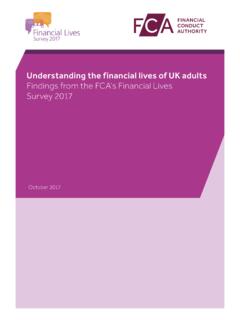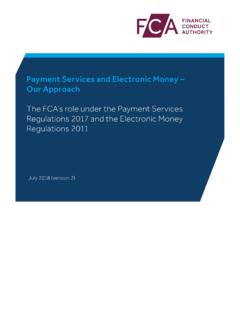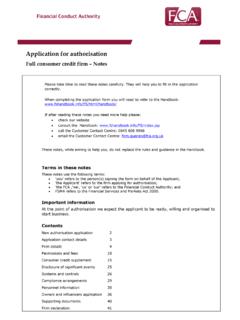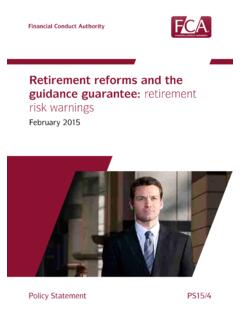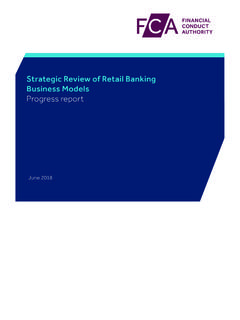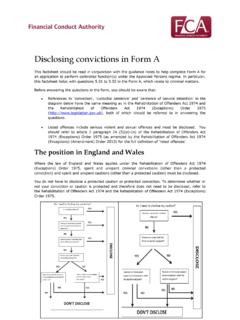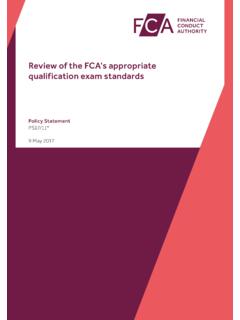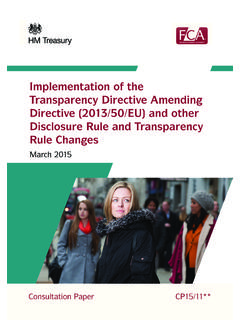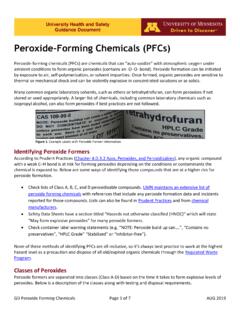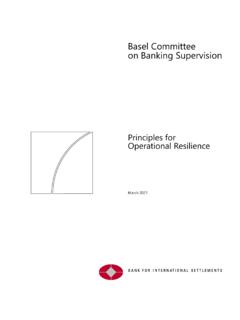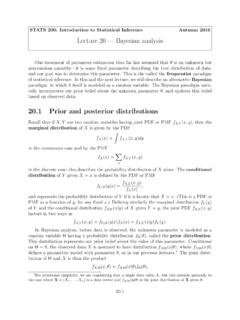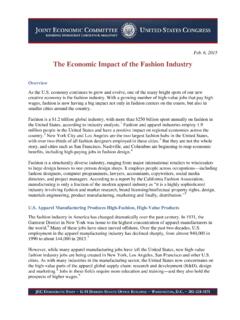Transcription of Dear CEO Letter: Supervisory review of global equity ...
1 [CEO] Nathana l Benjamin Executive Director Authorisations, Regulatory Technology, and International Supervision Prudential Regulation Authority David Bailey Executive Director UK Deposit Takers Supervision Prudential Regulation Authority Sarah Pritchard Executive Director Markets Financial Conduct Authority 10 December 2021 Dear CEO Supervisory review of global equity finance businesses Default of Archegos Capital Management In March 2021, the default of Archegos Capital Management family office (Archegos) resulted in over $10 billion of reported losses across multiple firms.
2 Following this significant event, the Prudential Regulation Authority (PRA), Financial Conduct Authority (FCA), and other global regulators have reviewed and assessed firms equity finance businesses, including for those who were counterparties to Archegos, focusing in particular on counterparty risk management. Having concluded this work, we are writing to draw your attention to a number of significant cross-firm deficiencies that were identified. The annex to this letter sets out the PRA s and FCA s main observations and expectations in the following areas: business strategy and organisation; onboarding and reputational risk; financial risk management controls and governance; and liquidation and close-out.
3 Our observations include weaknesses in the holistic management of risk across business units; narrow focus of onboarding arrangements and inadequate re-assessment of client relationships thereafter; ineffective and inconsistent margining approaches; and an absence of comprehensive limit frameworks. Many of the deficiencies set out in this letter are not new and have been observed In particular it is highly concerning that lessons from the global Financial Crisis have not been learned sufficiently and that necessary changes to business and risk management practices have not been embedded in firms operations.
4 A number of the shortcomings are symptoms of a broader root cause. Their origins often stem from a risk culture in which frontline business executives fail to take accountability for ownership of risk in their organisation; where the independent risk function lacks standing; and where senior management incentives do not promote safe, sound, and sustainable outcomes for the firm. 1 Including in communications such as (i) Observations on Risk Management Practices during the Recent Market Turbulence (March 2008); and (ii) Risk Management Lessons from the global Banking Crisis of 2008 (October 2009) , by the Senior Supervisors Group of Financial Stability Board.
5 This episode demonstrates the importance of firms investing sufficiently in their risk management frameworks and controls It further highlights the critical role of senior management in establishing and reinforcing an effective and appropriate internal risk culture. While this particular event did not ultimately have financial stability consequences, it led to material losses for certain firms and demonstrated the effects of leverage in the non-bank sector on other counterparties and markets.
6 The incident presented important lessons to learn for risk management in firms equity financing businesses which are necessary to ensure the risks associated with non-bank leverage do not lead to financial stability issues in the future. Required actions Given the impact of these issues and the importance we attach to their remediation, we expect you to carry out a systematic review of your equity finance business and its risk management practices and controls benchmarked against our findings set out in the annex below. While the observations set out in this letter are directly relevant to equity finance businesses and have been brought to light by the default of Archegos, we expect you to consider the highlighted themes more broadly across your sales and trading businesses, including but not limited to other forms of secured and synthetic financing activities, and to reference such work in your response.
7 For the avoidance of doubt, your review should cover all major prime brokerage activity, including, to the extent that you provide them, fixed income and derivative prime brokerage services. You should also address our broader observations on risk culture in your reply. You should report your findings to the PRA and the FCA together with detailed plans for remediation where relevant, by end of Q1, 2022. To ensure that any necessary improvements identified are made in a timely fashion, we expect you to consider reflecting progress when setting the variable remuneration of relevant senior executives.
8 The PRA and FCA expect firms to designate one or more Senior Managers (where applicable) to be responsible for providing a response to this letter including a remediation plan, to the extent relevant. If you have any questions, or would like to discuss the scope of your internal assessment work further, please do not hesitate to get in touch with your supervision team. Yours sincerely, Nathana l Benjamin Executive Director, Authorisations, Regulatory Technology, and International Supervision Prudential Regulation Authority David Bailey Executive Director, UK Deposit Takers Supervision Prudential Regulation Authority Sarah Pritchard Executive Director, Markets Financial Conduct Authority 2 Requirements in respect of risk management are set out in various parts of the PRA Rulebook and FCA Handbook.
9 Firms are directed, in particular to: (i) the high-level requirements in the Fundamental Rules of the PRA Rulebook requiring firms to have effective risk management systems and to control and organise their affairs responsibly and effectively; (ii) the Principles at PRIN of the FCA Handbook; and (iii) the rules in the FCA Handbook on Senior Management Arrangements, Systems and Controls (SYSC) to establish and maintain such systems and controls that are appropriate taking account of, amongst other things, the degree of risk. 2 ANNEX 1.
10 Business strategy and organisation In a number of cases, we observed that equity finance business strategies lacked coherence, were opportunistic, or otherwise had not been rigorously assessed or challenged by senior management. Revenue growth objectives and new business acquisition targets were not adequately supported by necessary investments in risk management resources and appropriate infrastructure. In some instances, equity finance franchises were fragmented, with similar activities split across different business units and locations, with separate management reporting lines.
